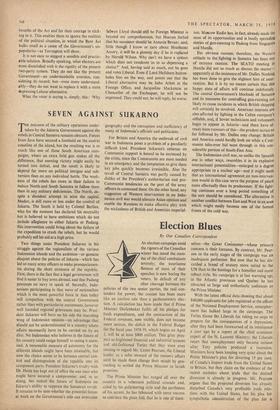SEVEN AGAINST SUKARNO
rr HE outcome of the military operations under- ' taken by the Jakarta Government against the rebels in Central Sumatra remains obscure. Forces from Java have secured a foothold on the central coastline of the island, but the resulting war is so much like one of those South American cam- paigns, where an extra field gun makes all the difference, that seeming victory might easily be turned into defeat, and the result is likely to depend far more on political intrigue and sub- version than on any individual battle. The weak- ness of the rebels lies more in their failure to induce North and South Sumatra to follow them than in any military deficiencies. The North, de- spite a dissident attempt to seize the capital, Medan, is still more or less under the control of Jakarta. The South is held by Colonel Barlian, who for the moment has declared his neutrality but is believed to have ambitions which do not include allegiance to either Jakarta or Padang. His intervention could bring about the failure of the expedition to crush the rebels, but he would probably sell his aid at a high price.
Two things assist President Sukarno in his struggle against the regionalism of the various Indonesian islands and the ambition—or genuine disquiet about the policies of Jakarta—which has led so many army officers to make pronunciamen- tos during the short existence of the republic. First, there is the fact that a legal government will find it easier to buy arms abroad, and that Padang possesses no navy to speak of. Secondly, Indo- nesians participating in that wave of nationalism which is the most powerful force in Asia today will sympathise with the central Government rather than with particularist movements, however well founded regional grievances may be. Presi- dent Sukarno will have on his side the marching wing of Indonesian opinion—an advantage that should not be underestimated in a country where affairs necessarily have to be carried on by an Rite. No Indonesian who believes in the future of his country could resign himself to seeing it atom-. ised. A reasonable measure of autonomy for the different islands might have been attainable, but now the choice seems to be between central con- trol and disintegration of the republic into its component parts. President Sukarno's rivalry with Dr. Hatta has kept out of office the one man who might have secured a compromise; -and, in so doing, has staked the future of Indonesia on Jakarta's ability to suppress the Sumatran revolt. It remains to be seen whether the powerful forces at work on the Government's side can overcome geography and the corruption and inefficiency of many of Indonesia's officials and politicians.
For Britain and America the outbreak of civil war in Indonesia poses a problem of a peculiarly difficult kind. President Sukarno's reliance on Communist support is bound to be increased by the crisis, since the Communists are most needed in an emergency and the temptation to give them key jobs quickly becomes irresistible. Also the revolt of Central Sumatra was partly caused by dislike of the President's authoritarian and pro- Communist tendencies on the part of the army officers in command there. On the other hand, any suggestion of Western intervention in an Indo- nesian civil war would alienate Asian opinion and enable the Russians to make effective play with the wickedness of British and American imperial- ism. Moscow Radio has, in fact, already made the most of its opportunities and is busily spreading stories of gun-running to Padang from Singapore and Manila.
For obvious reasons, therefore, the Western attitude to the fighting in Sumatra has been one of extreme caution. The SEATO meeting in Manila did not so much as discuss the matter-- apparently at the insistence of Mr. Dulles. Nothing has been done to give the slightest hint of inter- vention. But it is by no means certain that this happy state of affairs will continue indefinitely. The central Government's blockade of Sumatra and its measures for controlling gun-running are likely to cause incidents in which British shipping will certainly be involved. American interests are also affected by fighting in the Caltex company's oilfields, and, if Soviet technicians and volunteers begin to appear in Jakarta—and there have al- ready been rumours of this—the prudent tactics so far followed by Mr. Dulles may change. Britain and America could hardly look on while a Com- munist take-over bid went through in this con- siderable portion of South-East Asia.
The Indonesian civil war, so unlike the Spanish one in other ways, resembles it in its explosive international potentialities—enlarged to a degree appropriate to a nuclear age—and it might seem that an international agreement on non-interven- tion would in this case serve the purpose of peace more effectually than its predecessor. If the fight- ing continues over a long period something of the sort should be considered. The alternative is another conflict between East and West in an area which might easily become one of the hottest fronts of the cold war.


































 Previous page
Previous page